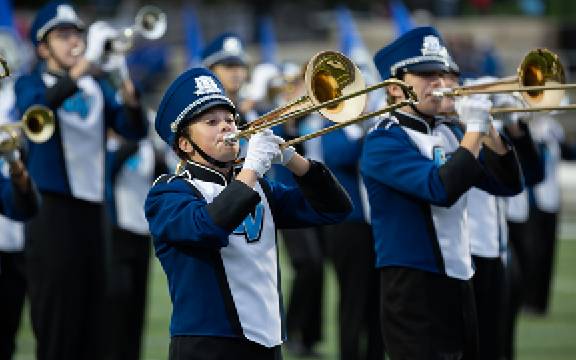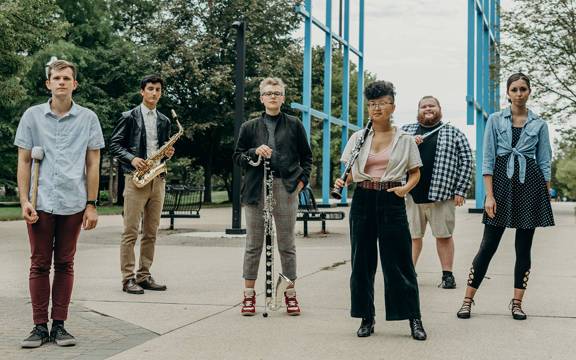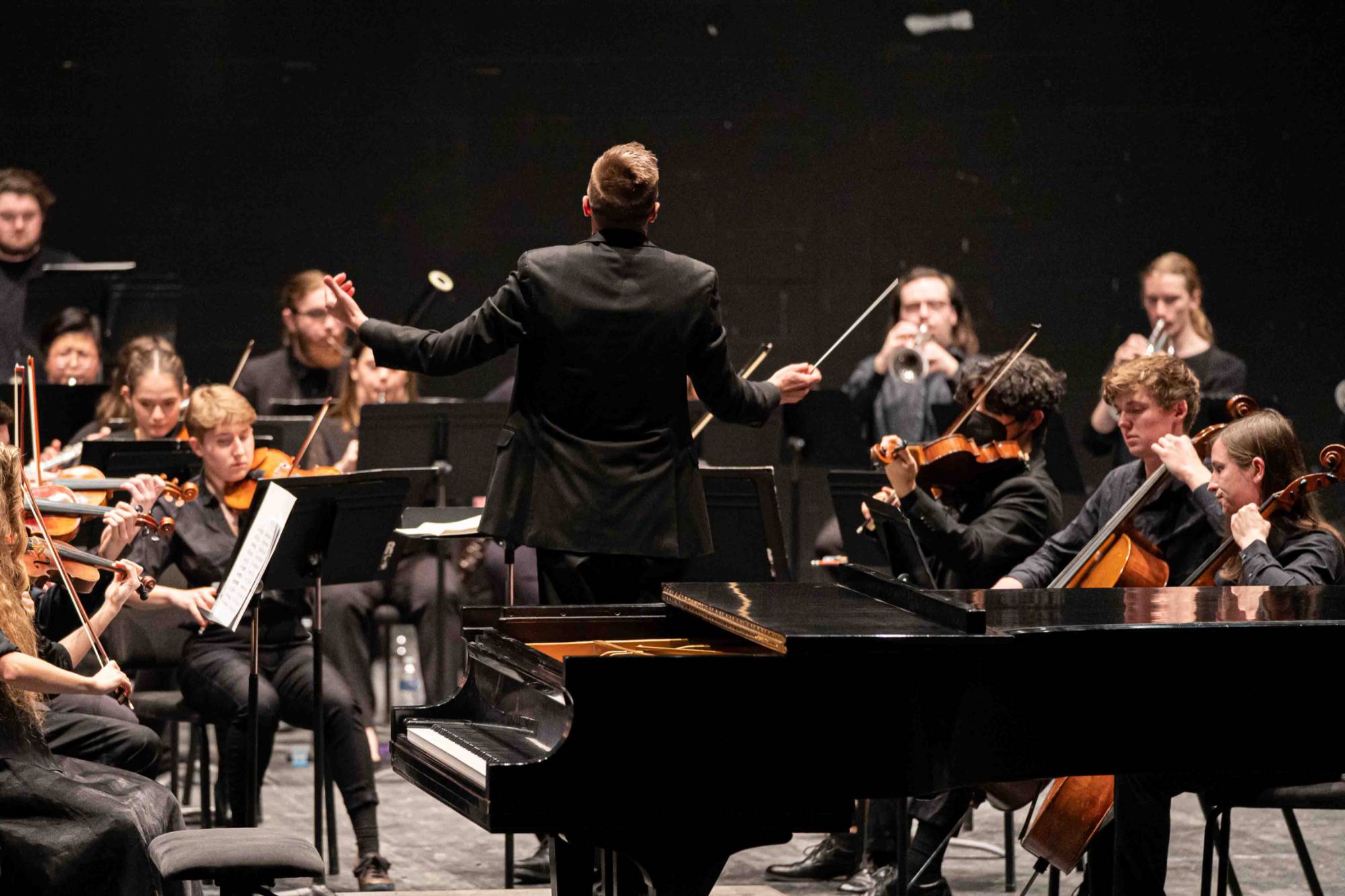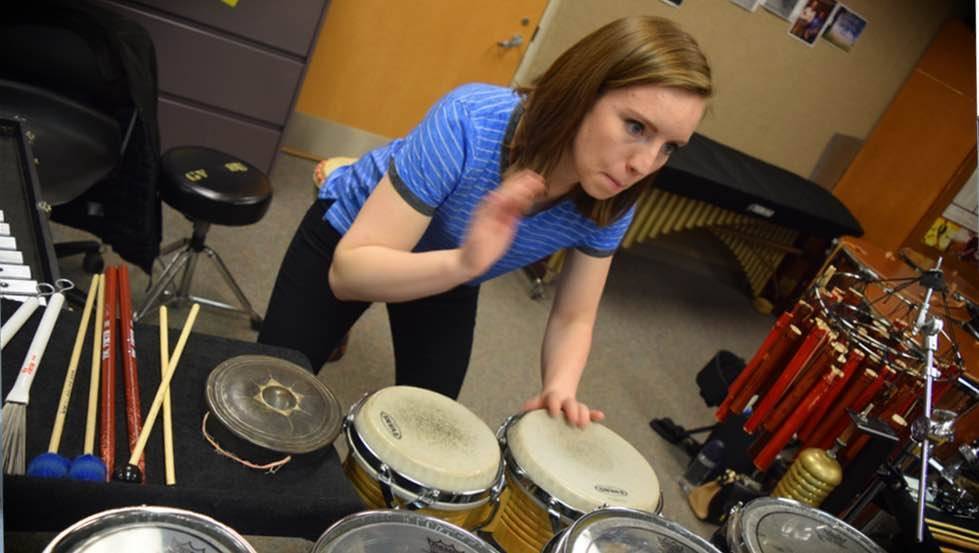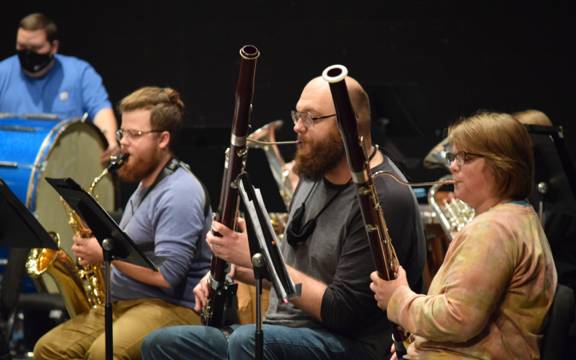Music at Grand Valley
Bachelor of Music Education (BME) | Bachelor of Music (BM) | Bachelor of Arts in Music (BA) | Bachelor of Science in Performing Arts Industry (BS) | Music Minor
Welcome
Welcome to Music at Grand Valley. Our program is housed in the Department of Music, Theatre, and Dance, which is a center for artistic excellence in musical performance, teaching, and scholarship. We offer curricula leading to three Bachelors degrees, as well as a minor option and a Piano Pedagogy Certificate. As an undergraduate-only program, our students have greater opportunities to learn and perform, and our small class sizes allow students to engage directly with our faculty members, who are committed to understanding and encouraging each student's unique talent and needs.
Whether you are looking to major or minor in music, participate in an ensemble, or attend one of our many music events, Music at Grand Valley welcomes you.
Degrees Offered
Music at GVSU offers curricula leading to the B.A., B.M., and B.M.E. degrees, as well as a Music Minor and Piano Pedagogy Certificate. These programs present music in the context of a broad liberal education, provide a course of study for the exceptionally gifted student who is interested in performance, composition, music technology, private studio teaching, or further graduate study, and prepares both vocal and instrumental students for careers in elementary and secondary school teaching. Additionally, the faculty is committed to providing cultural enrichment to students in all departments and to serving the university community by providing appropriate musical support for all facets of academic life. Grand Valley State University is an accredited institutional member of the National Association of Schools of Music.
The B.A. degree in Music provides a course of study for students interested in a liberal arts degree with a major in music. This degree, with its foreign language component, offers an appropriate background for prospective advanced-degree candidates who are preparing for careers in composition, technology, music history, music theory, jazz studies, library science, or independent studio teaching. It also works well for students who want to study music but are aiming at careers in other fields, and for students with double majors. There is sufficient flexibility within the B.A. to provide an opportunity for acquisition of those skills that are necessary in the current technological environment. The culmination event of the B.A. is a senior project planned and carried out with the help of a faculty advisor. Students electing a B.A. in music must complete a minimum of 41 credit hours in music, planned with the approval of a faculty advisor in the department.
Grand Valley State University is an accredited institutional member of the National Association of Schools of Music.
Admission
In addition to formal admission to Grand Valley, each applicant wanting to major or minor in music is required to arrange for a personal audition with the music department. When considerable geographical distance or extreme hardship prevents a personal audition, the applicant may, with the permission of the department, submit an audio recording of an appropriate performance. Entering first-year students and transfer students will be required to take a theory placement exam on audition day. A student with two or more years of piano experience will also be required to take a keyboard musicianship placement exam. Audition appointments should be made at least one month in advance. Recommended audition repertoire and an application can be found at www.gvsu.edu/music/.
Course Catalog: B.A. in Music Student Learning Outcomes: Music, B.A. Apply
The Bachelor of Music degree in Performance is a professional degree program. Although GVSU's required general education curriculum (for all degree programs) forms part of the BM in Performance curriculum and provides a sound liberal arts context for professional study, the main emphasis is on music performance. Designed for students who demonstrate exceptional ability and a particular interest in concentrating on performance at the undergraduate level, it is chosen often as preparation for graduate-level performance study in a master's or doctoral degree program. Professional performance and/or college-level teaching may be the primary goal.
Instruction in piano, harpsichord, organ, voice, guitar, harp, string, woodwind, brass, and percussion instruments is normally available. Students admitted to this program must complete a minimum of 84 credit hours in music, depending on track (vocal or instrumental) and initial keyboard placement. BM students must fulfill department concert attendance expectations, attend music major meetings, complete keyboard musicianship requirements, and perform a faculty-approved half-recital during the junior year and a full recital in the senior year. Before the junior year, students in this degree program also take appropriate literature and pedagogy courses. While students interested in composition or jazz often elect the BA degree course of study, BM students with abilities in composition and/or jazz studies have the opportunity to develop these skills as a secondary area within the BM program as well.
Grand Valley State University is an accredited institutional member of the National Association of Schools of Music.
Admission
In addition to formal admission to Grand Valley, each applicant wanting to major or minor in music is required to arrange for a personal audition with the music department. When considerable geographical distance or extreme hardship prevents a personal audition, the applicant may, with the permission of the department, submit an audio recording of an appropriate performance. Entering first-year students and transfer students will be required to take a theory placement exam on audition day. A student with two or more years of piano experience will also be required to take a keyboard musicianship placement exam. Audition appointments should be made at least one month in advance. Recommended audition repertoire and an application can be found at www.gvsu.edu/music/.
Course Catalog: Bachelor of Music Student Learning Outcomes: Music, B.M. Apply
A Comprehensive Program
The Bachelor of Music Education degree is a professional degree
program. Substantial training in music combines with professional
music education study and collaboration with the GVSU College of
Education. The program enables students to meet certification
requirements for teaching music in Michigan elementary and public
schools. The program has two tracks, vocal/choral and instrumental,
both of which result in K-12 Music Certification.
The Core Music Program
Musical training at GVSU emphasizes solo and ensemble performance
for all students. The core program also includes music theory, aural
perception, music history, and keyboard musicianship courses.
Music Methods
Choral teaching method experiences are acquired in class and in
observation and tutoring of public school students. In addition to
basic methods, students in the vocal/choral emphasis are afforded the
unusual opportunity to work with developing singers from local public
schools as part of a newly created course, "Teaching the
Developing Voice."
Instrumental music education students are given extensive training in an eight-semester sequence of voice and brass, woodwind, string, percussion instruments. Skills are further developed in the conducting class lab band/orchestra.
Beyond general teaching methods, B.M.E. instrumental students study the tenets of marching band techniques both in the classroom and on the field.
Keyboard Musicianship
An intensive keyboard musicianship curriculum and
state-of-the-art piano lab enable students with all entering keyboard
backgrounds to develop functional keyboard skills essential for music
teaching success. Private study is encouraged and offered beyond the
four-semester sequence of group study.
Professional Preparation
Students receive extensive field experience in a one-year
practicum, consisting of one semester of half-day teacher assisting
and one semester of full-day student teaching. Classes and seminars
taken concurrently with the practicum allow students to continually
identify and address issues crucial to effective music teaching.
NAfME
A collegiate chapter of the National Association for Music
Education (NAfME) is an active student organization in the Music
Department. Service work, professional development, and music
education advocacy are the group's primary missions.
Questions about the Music Education program at Grand Valley State University can be directed to: Charles Norris, Coordinator of Music Education, at (616) 331-3385 or e-mail [email protected] and Beth Gibbs, Associate Professor of Music Education, at (616) 331-2837 or e-mail [email protected].
Teachable Minor
Students interested in a second area of certification are
encouraged to contact the CLAS
Advising Center (616-331-8585). An additional teachable minor
would require up to one year of extra course work in that area.
College of Education requirements would count for both teachable
areas, with pre-service teaching distributed between certification areas.
Grand Valley State University is an accredited institutional
member of the National Association of Schools of Music.
Admission
In addition to formal admission to Grand Valley, each applicant wanting to major or minor in music is required to arrange for a personal audition with the music department. When considerable geographical distance or extreme hardship prevents a personal audition, the applicant may, with the permission of the department, submit an audio recording of an appropriate performance. Entering first-year students and transfer students will be required to take a theory placement exam on audition day. A student with two or more years of piano experience will also be required to take a keyboard musicianship placement exam. Audition appointments should be made at least one month in advance. Recommended audition repertoire and an application can be found at www.gvsu.edu/music/.
Course Catalog: Bachelor of Music Education Student Learning Outcomes: Music, B.M.E. Apply
The Bachelor of Science in Performing Arts Industry degree provides a
course of study for students interested in study of either music or
theatre in conjunction with study in Public and Nonprofit
Administration. Performing Arts Industry study is geared for students
interested in working within the arts field as administrators,
presenters, businesspeople, or any of the myriad options beyond
performance or education. The B.S. degree requires a cognate of STA
215 as well as two courses from the listed options. The culmination
event of the B.S. is an internship experience within the student’s
chosen field guided by a faculty advisor. Students electing a B.S. in
Performing Arts Industry must complete the Public and Nonprofit
Requirements as well as either the Music or Theatre core sequence,
planned with the approval of a faculty advisor in the department.
Students will complete 24 Credits of Public and Nonprofit
Administration Courses, and then either 39 Credits in Music, or 50
Credits in Theatre depending on their area of focus. Please
note, students entering the Music focus of this degree program are
required to complete a music major audition.
Course
Catalog More Information about the B.S.
in Performing Arts Industry
The music minor program is designed for students with previous training in music seeking non-music degrees who desire to increase their knowledge of music or further develop their skills in music. Students study music theory, aural perception, music history, keyboard musicianship, and a music elective. In addition, students take applied lessons and participate in major ensembles. Instruction in piano, harpsichord, organ, voice, guitar, harp, strings, woodwinds, brass, and percussion instruments is normally available. Students are admitted to this program through audition and must complete a minimum of 27 credit hours in music courses.
Grand Valley State University is an accredited institutional member of the National Association of Schools of Music.
Admission
In addition to formal admission to Grand Valley, each applicant wanting to major or minor in music is required to arrange for a personal audition with the music department. When considerable geographical distance or extreme hardship prevents a personal audition, the applicant may, with the permission of the department, submit an audio recording of an appropriate performance. Entering first-year students and transfer students will be required to take a theory placement exam on audition day. A student with two or more years of piano experience will also be required to take a keyboard musicianship placement exam.* Audition appointments should be made at least one month in advance. Recommended audition repertoire and an application can be found at www.gvsu.edu/music/.
The Piano Pedagogy Certificate (in the Department of Music and
Dance at Grand Valley State University) will enable undergraduate
piano majors and area piano teachers to focus on the skills necessary
for successful piano teaching. Students learn how to teach beginner,
intermediate, and early–advanced students. They learn how to teach
pre-college students as well as music majors who take keyboard as
their secondary instrument. They learn how to teach correct
technique, how to develop musicianship and good sight-reading skills,
how to select, level, perform, and teach repertoire, how to practice
efficiently, and how to motivate. Students learn about the most
important competitions and festivals in the state as well as in the
nation. The requirements for National Certification are covered in
the last semester of piano pedagogy.
This certification provides teachers with theoretical knowledge and practical experiences in accordance with state and national piano teaching guidelines. The piano pedagogy coursework includes guided teaching experiences. Students completing the Piano Pedagogy Certification will have a record of this accomplishment appear on their academic transcript, and a certificate for their piano studio.
To gain entrance into the program, an interview with the Piano Pedagogy professor and the performance of one memorized intermediate-level piano work will take place.
Course Catalog: Piano Pedagogy Certificate Student Learning Outcomes: Piano Pedagogy Certificate
Performing Ensembles
Our performance ensembles provide various opportunities for majors and minors to hone their skills, and for non-majors to incorporate music into their college career. Click on any of the images below to find out more about the different ensembles at Grand Valley State.
Upcoming Events
Oboe Day
March 7, 2026 9:00 AM - 8:00 PM
Greg Secor and Friends
March 15, 2026 4:00 PM - 5:15 PM
GVPCS: Finding America, Program #4
March 16, 2026 7:30 PM
MTD Student Recital: Levi Smith, cello
March 19, 2026 7:30 PM
MTD Student Recital: David Grimard, saxophone
March 20, 2026 7:30 PM
Music Program Audition Day
March 21, 2026 All Day
Featured News
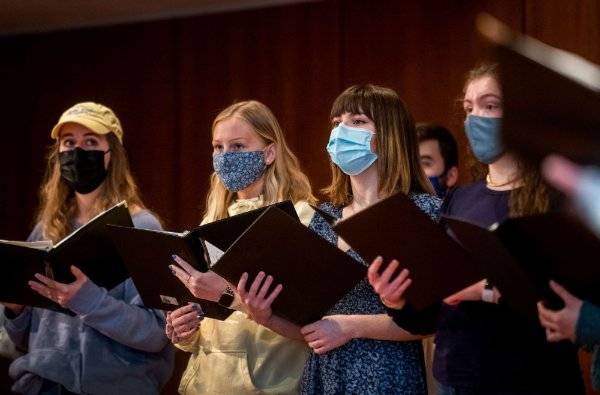
Photo by Kendra Stanley-Mills
GVNext Story on University Arts Chorale's "A Ukrainian Prayer" Performance
"We wanted to use our craft and art form to try to have the most positive response we could," said Wallace, assistant professor of music education. "It was an opportunity for us to work to make something beautiful so we can give it away."
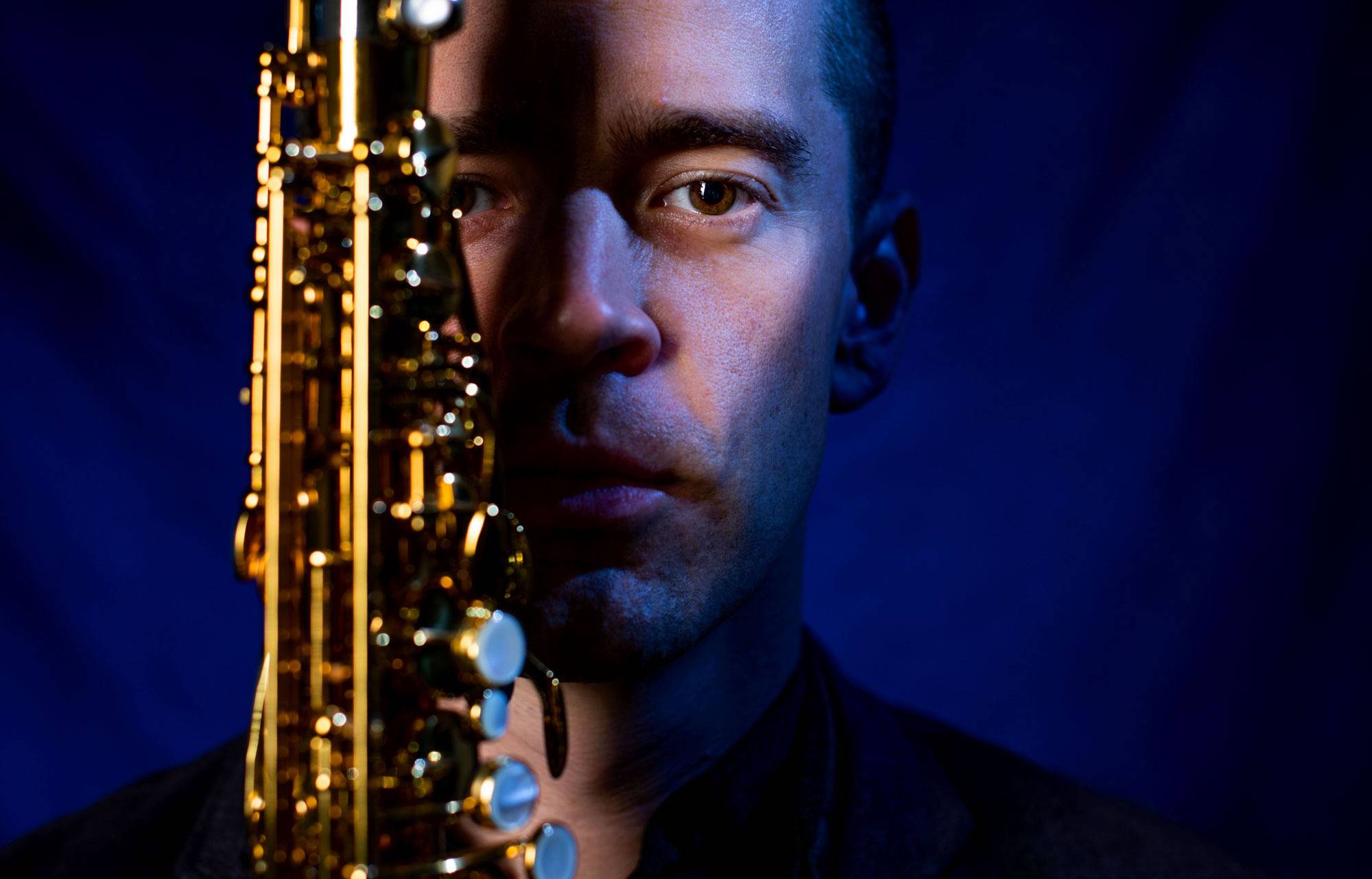
Photo by Kendra Stanley-Mills of Dr. Dan Graser
GVNext Story on Dr. Dan Graser's CHOPS Series
"This is certainly not an instrument that can rest on its laurels. As a contemporary saxophonist you need to have that light bulb moment, otherwise you are not pushing yourself as much as you should be."
GVNext featured Dr. Dan Graser and his saxophone pedagogy book series CHOPS. The series focuses on "updating the methods and techniques for players to a contemporary level.
Read more at https://www.gvsu.edu/.../gvsu-saxophonist-takes-it-up-an...
Music Professor Dr. Sookkyung Cho Discusses Her Love of Both Playing and Teaching Piano
Learn More about Laker Marching Band!
New Music Ensemble Music Video: Processations by Marc Mellits.
The Music Program is part of the Department of Music, Theatre, and Dance.
The Department of Music, Theatre, and Dance belongs to the College of Liberal Arts and Sciences, a student-centered and diverse learning community that engages in critical inquiry, extending knowledge to enrich and enliven individual and public life. Learn more at gvsu.edu/clas/.
Grand Valley State University is an accredited institutional member of the National Association of Schools of Music.
National Association of Schools of Music
11250 Roger Bacon Drive, Suite 21
Reston, Virginia 20190-5248
(703) 437-0700


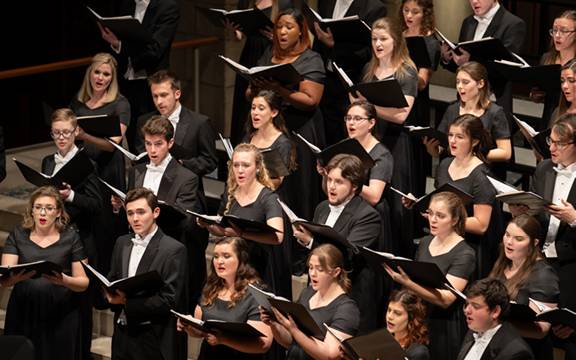
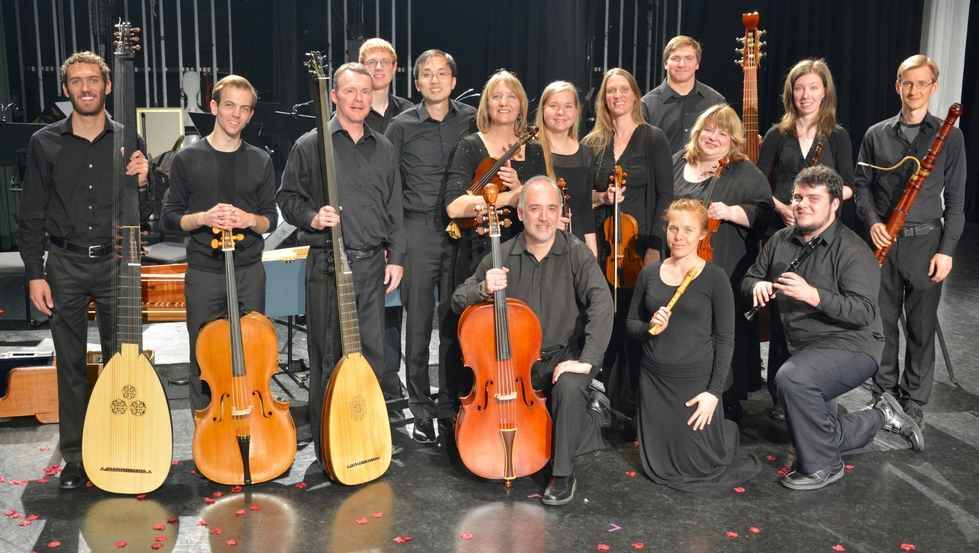
[1635357457].jpg)
